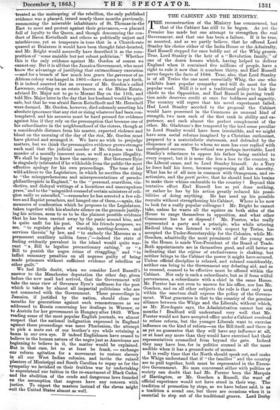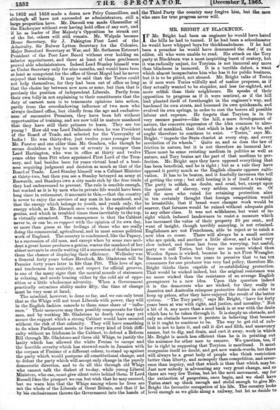THE CABINET AND THE MINISTRY.
T., reconstruction of the Ministry has commenced, but that of the Cabinet has still to be begun. As yet the Premier has made but one attempt to strengthen the real
Government, and that one has been a failure. If it be true, as asserted, and as we partly believe, that he offered Lord Stanley his choice either of the India House or the Admiralty, Earl Russell stepped for once boldly out of the Whig groove. True, Lord Stanley is the heir of a "Revolution family," of one of the dozen houses which, having helped to deliver England when it contained five millions of people, have a right to rule it now that it numbers thirty, and Earl Russell never forgets the facts of 1688. True, also, that Lord Stanley is of all Tories the one most essentially Whig, the one who exhibits least popular sympathy and will do most for the popular weal. Still it is not a traditional policy to look for chiefs to the Opposition, and Earl Russell in putting tradi tion aside deserves credit at once for boldness and sagacity. The country will regret that his novel experiment failed.
Had Lord Stanley acceded to the proposal the Cabinet would have possessed in the Commons an unusual kind of strength, two men each of the first rank in ability and ex- perience, and each almost the perfect complement of the other. Mr. Gladstone's fire tempered by the iced sense peculiar to Lord Stanley would have been irresistible, and we might have seen social reforms imagined by a Christian enthusiast, prepared by a materialistic statesman, and defended by the eloquence of an orator to whom no man has ever replied with undisputed success. The refusal was perhaps inevitable, Lord Stanley's reluctance to oppose his father being entitled to every respect, but it is none the less a loss to the country, to the Liberal cause, and to Lord Stanley himself. As a Tory he loses half his force, because suppressing all his sincerity. What has he of all men in common with Orangemen, and re- actionists, and the parti prtre, that he should lend his brains to make their whims endurable to the country Beyond this tentative effort Earl Russell has as yet done nothing, or rather he has by his action greatly reduced his possi- bilities of doing anything. He has used up his possible recruits without strengthening his Cabinet. Where is he now to look for a really popular colleague Mr. Bright he cannot take, unless he wants all the squires on both sides of the House to range themselves in opposition, and what other Commoner has he at disposal ? Mr. Forster, who really represented a party and a principle, who while uttering Radical ideas was listened to with respect by Tories, has accepted the Under-Secretaryship for the Colonies, while Mr.
Goschen, admittedly the most prominent of the young men in the House, is made Vice-President of the Board of Trade.
Both appointments are in themselves good, and still better as indicating that the re'gime of exclusiveness is shaking, but neither brings to the Cabinet the power it might have secured.
Unless official discipline is relaxed, and relaxed considerably, neither can bring to the Govi3rnment any debating aid, and as to counsel, counsel to be effective must be offered within the Cabinet. Not only is each a subordinate, but as if from wilful perverseness, a subordinate with a chief in the same House. Mr. Forster has not even to answer for his office, nor has Mr.
Goschen, and on all other subjects the rule is that only men within the sanctum shall express the policy of the Govern- ment. What guarantee is that to the country of the genuine alliance between the Whigs and the Liberals, without which, as Mr. Newdegate says, the Administration cannot last six months ? Bradford will understand very well that Mr. Forster would not have accepted office under a Cabinet resolved to refuse reform, but the younger Liberals want to exercise influence on the kind of reform—on the Bill itself, and there is as yet no guarantee that they will have any influence at all, or at least any more than they would have exercised had their representatives counselled from beyond the gate. Indeed they may have leas, for in politics counsel is all the more audible when it has a ground-note of menace.
It is really time that the North should speak out, and make the Whigs understand that if "the families" and the country are to pull together, both must be represented in the Execu- tive Government. No man conversant either with politics or society can doubt that had Mr. Forster been the Marquis of Hartington, or Mr. Goschen a Russell, the want of official experience would not have stood in their way. The tradition of promotion by steps, as we have before said, is as a tradition a sound one, but there are occasions when it is essential to step out of the traditional groove. Lord Derby in 1852 and 1858 made a dozen new Privy Councillors, and although all have not succeeded as administrators, still a large proportion have. Mr. Disraeli was made Chancellor of the Exchequer without ever having held office of any sort, and if he as leader of Her Majesty's Opposition be struck out of the list, others will still remain. Mr. Walpole became Home Secretary, Sir J. Pakington First Lord of the Admiralty, Sir Bulwer Lytton Secretary for the Colonies, Major Beresford Secretary at War, and Mr. Sotheron Estcourt President of the Poor Law Board without ever holding an inferior appointment, and three at least of these gentlemen proved able administrators. Indeed Lord Stanley himself was an Under Secretary only for nine months, and would have been at least as competent for the office of Great Mogul had he never enjoyed that training. It may be said that the Tories could not help themselves, for they had been out of office so long that the choice lay between new men or none, but then that is precisely the position of independent Liberals. Partly from their own folly in not explaining to their constituents that the duty of earnest men is to transmute opinions into action, partly from the overshadowing influence of two men who always declined office, but chiefly from the age and exclusive- ness of successive Premiers, they have been left without opportunities of training, and are now told in mature manhood that they have still their primers to learn. They are too young ? How old was Lord Dalhousie when he was President of the Board of Trade, and selected for the Viceroyalty of India ? He was thirty-five, just twelve years younger than Mr. Forster and one older than Mr. Goschen, who though he seems doubtless a boy to men of seventy is younger than Lord Hartington, who was in office at thirty and twelve years older than Pitt when appointed First Lord of the Trea- inuy, and had besides been for years virtual head of a busi- ness requiring judgment and decision as much as that of the Board of Trade. Lord Stanley himself was a Cabinet Minister at thirty-two, but then you see a Stanley betrayed an army at Bosworth, and Stanleys own a city made rich by the free trade they had endeavoured to prevent. The rule is sensible enough, but worked as it is by men who in private life would have been long since in retirement, it amounts to this,—that the country is never to enjoy the services of any man in his manhood, and that the energy which belongs to youth, and youth only, the energy which, as Mr. Disraeli once wrote, is the equivalent of genius, and which in troubled times rises inevitably to the top, is virtually ostracized. The consequence is that the Cabinet never is, or can be, en rapport with the opinion of its own day, or more than guess at the feelings of those who are really doing the commercial, agricultural, and in most senses political work of England. The country is condemned, like the Papacy, to a succession of old men, and except when by some rare acci- dent a great house produces a genius, wastes the manhood of her ablest servants in sterile waiting till a succession of deaths leaves them the chance of displaying their efficiency. Wellesley was a General forty years before Havelock, Mr. Gladstone will be Premier forty years later in life than Pitt. This love of age, and tenderness for seniority, and respect for official grooves, is one of the many signs that the mental muscle of statesmen is relaxing, and needs bracing either by the cold air of oppo- sition or a little wholesome adversity. When a Government practically ostracizes ability under fifty, the time of change must be very near at hand.
The mischief, however, is done so far, and we can only trust that as the Whigs will not trust Liberals with power, they will in the English fashion concede to them some share of "influ- ence." Their measures may then possibly compensate for their men, and by working Mr. Gladstone to death they may yet secure the support which a strong Cabinet would have ensured without the risk of that calamity. They will have something to do when Parliament meets, to face every kind of Irish diffi- culty without an Irishman in the Cabinet, to defend a Reform Bill through Mr. Gladstone and three old Whigs, to justify the laxity which has allowed the white Fenian to escape and the horrible severity which has strewed roads in Jamaica with the corpses of Fenians of a different colour, to stand up against the party which would postpone all constitutional change, and to defeat the party which will accept only change in the purely democratic direction, and to do all this through old Whigs who cannot talk the dialect of to-day, while young Liberal Ministers, who can, must give silent -votes behind them. If Lord Russell likes the prospect we can but wish that he may succeed, but we warn him that the Whigs among whom he lives are not the whole of the Liberals of Great Britain, and that if he by his exclusiveness throws the Government into the hands of the Third Party the country may forgive him, but the men who care for true progress never will.



































 Previous page
Previous page